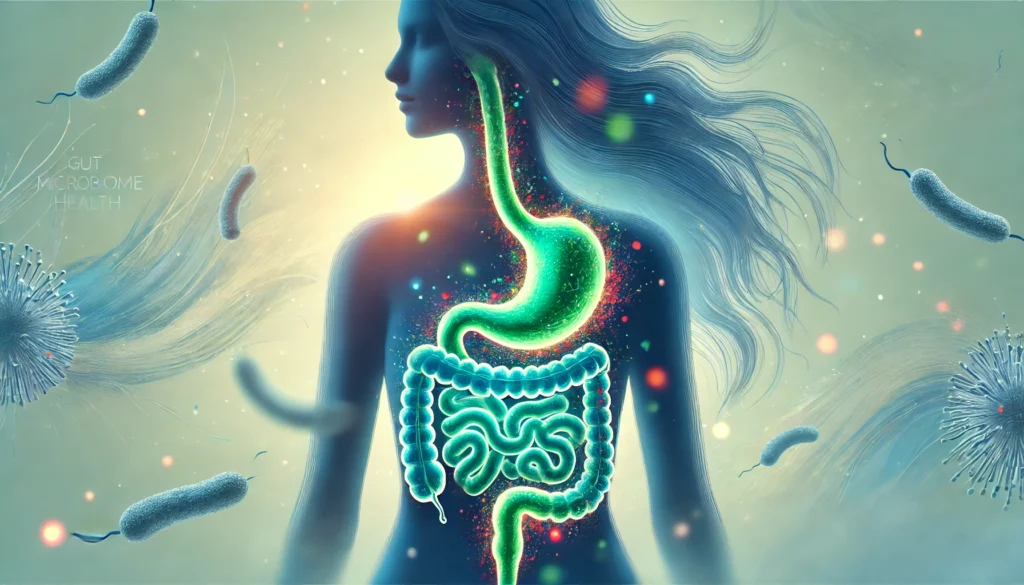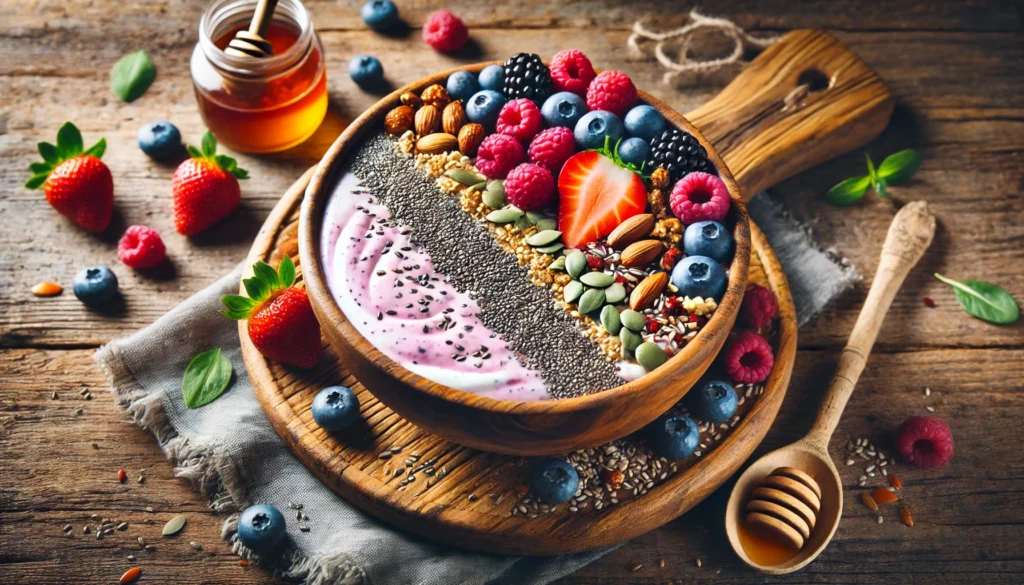Understanding the Importance of Gut Health
Gut health is a cornerstone of overall well-being, influencing digestion, immune function, and even mental health. The gut microbiome, a complex ecosystem of trillions of microorganisms, plays a critical role in nutrient absorption, metabolism, and defense against pathogens. When gut health is compromised, issues such as bloating, fatigue, brain fog, and weakened immunity can arise. Implementing a gut health detox can help restore balance, eliminate harmful toxins, and promote optimal digestive function. This article explores ten scientifically-backed ways to reset your gut health naturally and support long-term well-being.
You may also like: How to Improve Gut Health Naturally: Science-Backed Tips for a Stronger Microbiome
Nourish Your Gut with a Gut Cleanse Diet
A gut cleanse diet is fundamental to restoring gut health. Eliminating processed foods, artificial sweeteners, and excessive sugars can help reduce inflammation and allow beneficial gut bacteria to thrive. Whole foods rich in fiber, such as leafy greens, fruits, legumes, and whole grains, promote regular bowel movements and feed good bacteria. Incorporating fermented foods like yogurt, sauerkraut, and kimchi introduces probiotics that enhance microbiome diversity. Additionally, staying hydrated with filtered water supports digestion and flushes toxins, making the gut cleanse diet a vital component of a digestive detox plan.
Increase Fiber Intake for Effective Gut Detoxification
Fiber is essential for gut health as it serves as fuel for beneficial bacteria while aiding in waste elimination. Soluble fiber, found in oats, beans, and flaxseeds, forms a gel-like substance that supports bowel regularity and stabilizes blood sugar levels. Insoluble fiber, present in vegetables and whole grains, adds bulk to stools and prevents constipation. A well-balanced gut detox diet should include a variety of fiber sources to promote microbial diversity and digestive efficiency. Additionally, fiber-rich foods help sweep away toxins, ensuring a thorough gut health detox.
Support Gut Health with Probiotics and Prebiotics
Probiotics are live beneficial bacteria that support digestion and immunity, while prebiotics are non-digestible fibers that nourish them. Together, they form a powerful duo in maintaining a balanced gut microbiome. Foods like kefir, miso, and pickles are rich in probiotics, while garlic, onions, and bananas provide prebiotic nourishment. Supplementing with high-quality probiotics can be particularly beneficial for individuals recovering from antibiotic use or experiencing persistent digestive issues. A well-planned gut cleanse protocol incorporates both probiotics and prebiotics to ensure long-term gut health stability.
Reduce Inflammatory Foods and Toxins
Chronic inflammation can disrupt gut balance and contribute to conditions such as leaky gut syndrome and irritable bowel syndrome (IBS). Processed meats, fried foods, refined sugars, and excessive alcohol can all trigger inflammation in the digestive tract. To support a gut detox diet, replacing inflammatory foods with anti-inflammatory options like turmeric, ginger, and green tea can aid healing. Moreover, choosing organic produce reduces exposure to pesticides and harmful chemicals, allowing for a more effective digestive detox plan.
Engage in Intermittent Fasting to Promote Gut Reset
Intermittent fasting is a powerful tool for resetting the gut naturally. By allowing the digestive system to rest, fasting supports autophagy, a cellular process that removes damaged cells and toxins. Different fasting methods, such as the 16:8 method, where eating is restricted to an eight-hour window, can enhance gut microbiome diversity and reduce bloating. Implementing intermittent fasting alongside a gut detox diet can improve digestion and overall gut health over time.

Hydrate Properly for Optimal Digestion
Water is essential for digestion, nutrient absorption, and toxin elimination. Dehydration can lead to constipation, sluggish digestion, and an imbalance in gut flora. Drinking sufficient filtered water throughout the day aids in flushing out harmful bacteria and maintaining a clean stomach. Herbal teas like peppermint, chamomile, and dandelion further support digestion and complement a gut cleanse diet. Hydration is a fundamental component of any digestive detox plan.
Reduce Stress to Improve Gut Function
The gut-brain axis illustrates the profound connection between mental health and gut health. Chronic stress can disrupt digestion by altering gut microbiome composition and increasing inflammation. Incorporating stress-reducing practices like meditation, deep breathing, and yoga can positively impact gut health. A well-structured gut cleanse protocol not only focuses on dietary changes but also integrates mindfulness techniques to support holistic well-being.
Improve Sleep Quality for Gut Restoration
Sleep plays a crucial role in gut health by regulating circadian rhythms and allowing for digestive repair. Poor sleep has been linked to imbalances in gut bacteria, leading to issues such as bloating and metabolic dysfunction. Creating a bedtime routine that prioritizes quality sleep, including limiting screen time before bed and maintaining a consistent sleep schedule, can aid in gut detoxification. A healthy gut reset diet is most effective when combined with adequate rest and recovery.
Engage in Regular Physical Activity for Gut Motility
Exercise stimulates gut motility, reducing the risk of constipation and promoting microbial diversity. Physical activity has been shown to positively influence gut bacteria composition, supporting overall digestive health. Activities such as walking, jogging, and yoga enhance circulation to the gut and improve the efficiency of the digestive detox plan. A balanced lifestyle that includes movement is essential for maintaining long-term gut health.

Frequently Asked Questions (FAQ) on Gut Health Detox and Natural Gut Reset
What are the signs that my gut needs a detox?
Your body often provides clear signals when your gut health is compromised. Chronic bloating, irregular bowel movements, and persistent digestive discomfort may indicate an imbalance in gut bacteria. Additionally, experiencing unexplained fatigue, skin breakouts, and frequent infections suggests that your gut microbiome may not be functioning optimally. Poor gut health can also manifest as brain fog, difficulty concentrating, or mood swings due to the gut-brain connection. Implementing a structured gut health detox can help alleviate these issues and restore digestive harmony.
How does a gut cleanse diet improve overall health?
A well-structured gut cleanse diet does more than just support digestion. It eliminates harmful toxins, reduces inflammation, and strengthens the immune system by fostering a diverse gut microbiome. By focusing on fiber-rich foods, fermented options, and whole nutrients, you can create an environment that promotes beneficial bacteria while minimizing the presence of harmful pathogens. This dietary approach also enhances nutrient absorption, ensuring that your body efficiently utilizes vitamins and minerals. Over time, a balanced gut cleanse diet contributes to clearer skin, improved mental clarity, and sustained energy levels.
What are the best natural ways to clean my gut?
Learning how to clean your gut naturally involves a combination of dietary changes, hydration, and lifestyle modifications. Consuming probiotic-rich foods such as yogurt, kimchi, and miso helps populate your gut with beneficial bacteria. Increasing fiber intake from sources like flaxseeds, beans, and whole grains assists in eliminating waste and toxins. Hydration is equally crucial—drinking adequate water and herbal teas aids in flushing out unwanted substances. Regular physical activity and stress reduction techniques, such as meditation, further support gut balance by regulating digestion and reducing inflammation.
Can intermittent fasting help with gut detoxification?
Intermittent fasting is a highly effective strategy in a gut detox diet. It allows your digestive system time to rest, reducing inflammation and enhancing gut microbiome diversity. Fasting activates autophagy, a process that helps eliminate damaged cells and toxins, promoting overall gut health. Various fasting methods, such as the 16:8 approach, in which food is consumed during an eight-hour window, can significantly improve digestion and reduce bloating. Pairing intermittent fasting with a gut cleanse protocol can accelerate the healing and restoration of your digestive system.
How long does it take to reset your gut naturally?
The duration required to reset your gut naturally depends on the individual’s lifestyle, diet, and the severity of gut imbalance. Many people notice initial improvements within a few days of following a gut reset diet, including reduced bloating and increased energy levels. However, a complete gut health transformation can take anywhere from four to twelve weeks, depending on consistency with dietary and lifestyle adjustments. Incorporating long-term habits, such as a fiber-rich diet, hydration, and stress management, ensures sustainable gut health improvements. By adhering to a digestive detox plan, you can experience lasting benefits and prevent future imbalances.
What role does hydration play in gut health?
Proper hydration is fundamental to a successful gut detox diet. Water aids in breaking down food for nutrient absorption, facilitating smooth digestion, and preventing constipation. Drinking sufficient fluids also helps transport waste and toxins out of the body, reducing the risk of digestive discomfort. Herbal teas like ginger, peppermint, and chamomile can support gut health by soothing inflammation and promoting digestive regularity. Dehydration, on the other hand, can slow down metabolism and lead to the accumulation of harmful bacteria in the gut. Ensuring adequate hydration is an integral part of any effective digestive detox plan.
Are there specific foods to avoid during a gut detox?
Yes, certain foods should be eliminated during a gut detox diet to maximize its effectiveness. Processed foods high in artificial additives, preservatives, and refined sugars contribute to inflammation and disrupt gut bacteria balance. Dairy products, especially those containing lactose, may cause digestive distress for individuals with sensitivities. Excessive caffeine and alcohol intake can irritate the digestive tract, making it harder for beneficial bacteria to thrive. Gluten-containing grains may also trigger inflammation in those with gut sensitivities. Sticking to whole, nutrient-dense foods is essential when following a gut cleanse protocol.
How does stress impact gut health, and how can I manage it?
Chronic stress negatively affects gut health by altering microbiome composition, increasing gut permeability, and triggering inflammation. The gut-brain connection means that emotional distress can lead to symptoms such as bloating, constipation, or diarrhea. Engaging in stress-management techniques like deep breathing exercises, yoga, and mindfulness meditation helps regulate digestion and support a gut health detox. Additionally, engaging in hobbies and social interactions fosters emotional well-being, which in turn enhances gut function. Prioritizing mental wellness is a crucial but often overlooked component of a comprehensive digestive detox plan.
Can exercise contribute to a gut cleanse?
Regular physical activity plays a significant role in maintaining gut health. Movement stimulates intestinal motility, ensuring efficient waste elimination and reducing the risk of constipation. Exercise has been shown to increase microbial diversity, fostering a healthier gut microbiome. Activities like brisk walking, yoga, and strength training contribute to better digestion and reduced gut inflammation. Additionally, sweating during workouts helps remove toxins from the body, complementing the benefits of a gut detox diet. Maintaining an active lifestyle is an excellent way to support a gut reset diet and overall digestive well-being.
How can I maintain gut health after completing a detox?
Sustaining the benefits of a gut cleanse protocol requires ongoing commitment to gut-friendly habits. Continuing a fiber-rich diet with prebiotics and probiotics ensures long-term microbial balance. Staying hydrated, managing stress, and getting sufficient sleep all contribute to a well-functioning digestive system. Avoiding processed foods, excessive sugar, and artificial additives minimizes the risk of gut imbalances recurring. Regular exercise and intermittent fasting can also help maintain gut health post-detox. By making these practices part of your routine, you can enjoy lasting improvements in digestion, immunity, and overall vitality.

The Science of Resetting Your Gut Naturally
Scientific research continues to highlight the profound impact of gut health on overall wellness. By implementing a gut cleanse diet, reducing stress, and prioritizing hydration and sleep, individuals can naturally reset their gut health. A comprehensive digestive detox plan that incorporates these ten strategies ensures long-term benefits, improving digestion, immunity, and mental clarity. Taking proactive steps toward gut health restoration leads to a healthier, more vibrant life.
gut microbiome balance, digestive health support, probiotics and prebiotics, natural gut healing, holistic digestion solutions, gut-friendly foods, anti-inflammatory diet, microbiome restoration, digestive wellness plan, fermented foods benefits, healthy gut bacteria, fiber for digestion, immune system and gut health, detoxification strategies, hydration for digestion, gut-brain connection, natural digestive remedies, lifestyle changes for gut health, stress and digestion, long-term gut maintenance
Further Reading:
Diet and Gastric Pain: Foods to Avoid and Foods That Help
8 Natural Remedies for Upset Stomach
What to eat when you’re stressed out
Disclaimer
The information contained in this article is provided for general informational purposes only and is not intended to serve as medical, legal, or professional advice. While Health11News strives to present accurate, up-to-date, and reliable content, no warranty or guarantee, expressed or implied, is made regarding the completeness, accuracy, or adequacy of the information provided. Readers are strongly advised to seek the guidance of a qualified healthcare provider or other relevant professionals before acting on any information contained in this article. Health11News, its authors, editors, and contributors expressly disclaim any liability for any damages, losses, or consequences arising directly or indirectly from the use, interpretation, or reliance on any information presented herein. The views and opinions expressed in this article are those of the author(s) and do not necessarily reflect the official policies or positions of Health11News.


